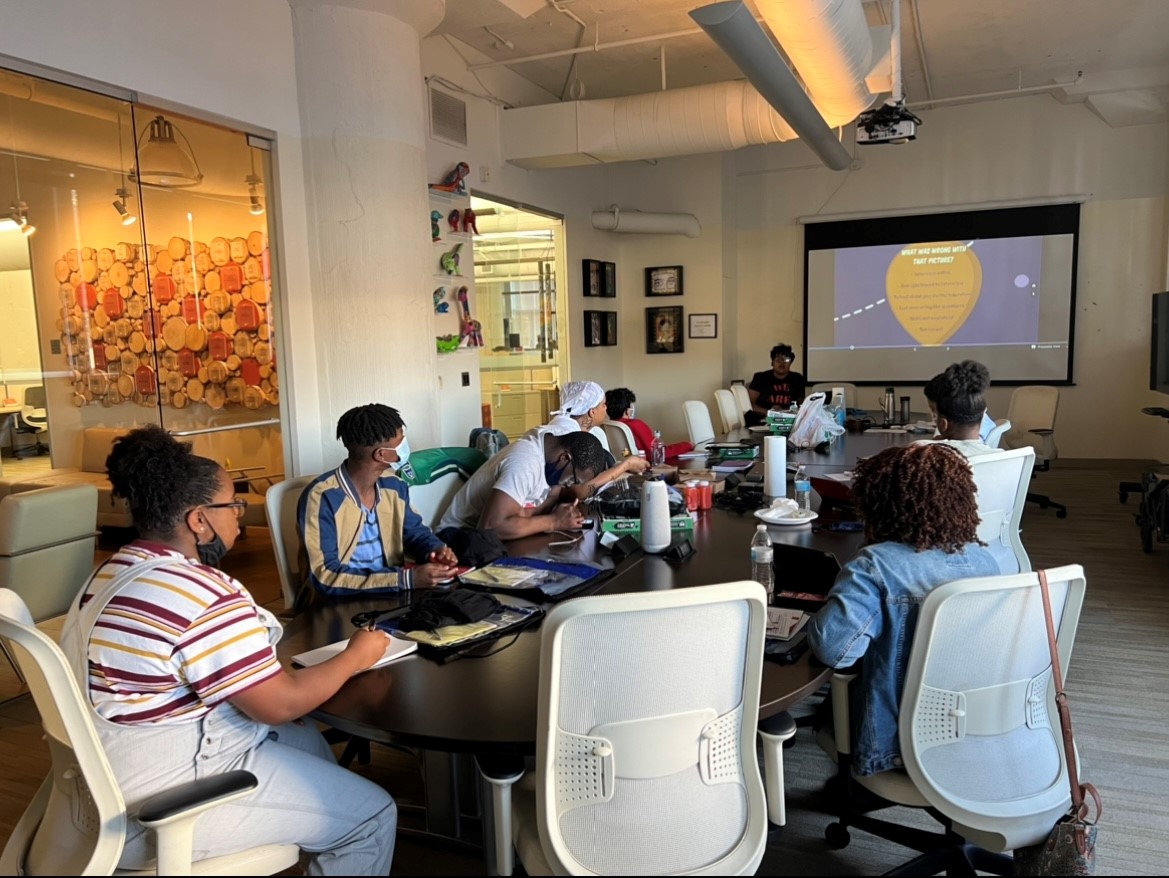Big Thought: Building Opportunity for Youth in Dallas-Fort Worth Area

by Sher Jamal Stone
Big ideas are turning into big realities in the Dallas-Fort Worth area of Texas with the addition of one of OYUnited’s newest Community Action Teams (CATs). With the generous support of State Farm, OYUnited was able to launch this exciting partnership earlier this year, and they have big plans going into 2022.
Big Thought began in 1987 as an affiliate of Young Audiences, an out of school time program focused on reintroducing art into the curriculum after sea change emphasized STEM in classrooms. Since the early days, Big Thought has innovated to bring young people into the arts through cultural performances, slam poetry, and programming developed for youth traditionally overlooked in education systems. From that kernel, they’ve bloomed into an organization committed to connecting youth to opportunities wherever they are.
Vicent Coronado, who serves as Opportunity Advisor at Big Thought after working for 5 years as a juvenile probation officer in Texas, knows firsthand the limited alternatives for kids who cannot better their circumstances. Hear more from him and Armando Banchs, Director of College & Career Programs, as they talk about Big Thought’s decades-long history in out of school learning, activism, and youth empowerment, and how their newest commitment to Opportunity Youth embodies a continuation of their organization’s “north star” vision for youth leadership.
Question: How did Big Thought emerge into the Opportunity Youth space?
Armando Banchs: For years Big Thought has been serious about changing avenues for people. Many stories in nonprofit work start with people that meant well, but were in spaces doing things for Black and brown people with zero input from the community. So we’ve been very intentional in the last five years to really try to create spaces where we’re asking the community to come in and work with us as partners and not tell them what they need, but listen. And so the only place we didn’t have ears was with the youth.
Vincent: With the launch of the Youth Advisory Council (YAC) this past summer of 2021 in June, the idea was to actually have youth representation at the table. Not only when we’re talking about youth themselves, but also when we’re talking about where the money goes within Big Thought as an organization, and actually having youth representation at future board meetings. Young people can actually feel like they have a say and know that what they say is actually taken into consideration regarding decisions made, not just for themselves, but for other youth that we serve as an organization.
Young people can actually feel like they have a say and know that what they say is actually taken into consideration regarding decisions made, not just for themselves, but for other youth that we serve as an organization.
Right now we have 11 young people that have been consistently coming to the meetings. We’ve been meeting twice a month since September, and during those meetings have included trainings and workshops from guest speakers to sharpen their skill sets that way. That way, when they do finally step into a boardroom, they’re ready to deliver, and not feel out of place or overwhelmed. The youth that are part of this program range in age from 14 to 24, and are all young people that have come from different programs that we’ve done within Big Thought.
Armando: COVID hit so it’s been a long time coming, but we’ve finally got Youth Advisory positions in and we’re hearing from them. And from there we’re trying to create spaces for our youth to speak, so we’re pulling some of our YAC members and youth in other programs into this new Community Action Team, so we can get some action going and more events for them.
How did Big Thought get into touch with Opportunity Youth United?
Vincent Coronado: Over a year ago, I attended a virtual conference, and Lashon Armando, the Interim Project Director for Opportunity Youth United, was one of the guest speakers. He was telling everyone in attendance about Opportunity Youth United and how Community Action Teams get youth engaged across the country.
In my role as Opportunity Advisor at Big Thought, we were trying to find a way to get youth more involved and aligned with our organization. So I reached out to Lashon and Armando, himself, and I started the conversation. So this has been in the works for a minute, and we’re super excited to get this rolling.
How did your experience as a juvenile probation officer impact your work here?
Vincent: Prior to working with Dallas County Juvenile Department, when I was in college, I did an internship with the Travis County Juvenile Department, which is in the Austin area. And it really opened my eyes, just becoming a probation officer, or even just working with young people in general, to the hardships that people can face and have to overcome.
That drew me in a lot to choosing a career in the justice system, particularly the juvenile justice system. I ran a program when I was a probation officer for first-time offenders that had one or multiple mental health diagnoses. And over time I became the only probation officer that did that program for the entirety of Dallas county. So I had youth who lived hours away from each other at some point in time and I had to go do home visits and school visits with them on a regular basis.
Seeing them successfully complete the program with me and getting those initial charges taken off the record felt super fulfilling and really helped me continue on the work. And then I happened to find out about Big Thought’s Creative Solutions program, and I was able to refer youth on my caseload to them. So I was able to see Big Thought staff regularly during the summer program, I was able to interact with them, and interact with not just my students on my caseload, but the other students. The change in these kids from day one to the end of week seven was almost night and day.
Fulfillment as a probation officer is never having to see that child again. I considered that a win. Because if I was still working in the justice system and I happened to find them, I knew that something had to have happened where they recommitted an offense. And then they’re back in the revolving door that’s the justice system. So finding my way over to Big Thought is a continuation of the work that I was already doing as a probation officer.
At Big Thought, I feel like now it’s on a grander scale and I have more reach than when I was an officer. Because once a kid finishes probation, that’s it. You’re not encouraged to reach out to that family or that youth again just to check up on them and see how they’re doing. But in my role as Opportunity Advisor, there’s not an expiration date on how long I can work with a young person. I can work with them from 18 to 25 if they want to continue working with me. But I hope to get to a point where I can set them up, where they reach a point themselves and say, “Hey, I appreciate all your help, but I got this from here.”
That’s my own personal goal: to set every young person that I work with up to where they can say that to me.
What should people know about Opportunity Youth in Dallas?
Vincent: One thing I can say about Opportunity Youth in Dallas is that once you start building a relationship with them they’re not afraid to ask when they need help. Building a relationship with youth is key at first, because I’ve done a lot of cold calls with some of the alumni that I currently work with, and I try to explain to them what I do, and if they don’t feel a connection and I don’t continue to follow up with them they’re not going to buy-in. Having that buy-in is definitely key.
Once you have that buy-in, they’re not gonna be afraid to text you, email you, call you like, “Hey, yo, I need a food pantry box. Could you get me one please?” or, “Hey, do you have any job resources that you can send me?” That’s been one of the biggest hurdles I’ve had to overcome is just establishing that simple connection, especially with someone that I’ve had no prior connection with before.
Armando: Our Opportunity Youth are amazing. They’re gonna do the hustle. Some of our kids are traveling three hours on a bus and train to do four hours of work. They’re gonna do what they need to do. They’re amazingly creative. There’s nothing they can’t do. And like Vincent said, part of our job here is to try to make sure we give ’em the resources we can, but they’re not gonna sit back.
They’re not lazy. There’s this idea that this generation is so lazy, but they’re the most innovative generation. It’s amazing what they’re doing with all the problems that are falling on their shoulders. Our Opportunity Youth have been willing to face the truth and willing to carry the load.
Our Opportunity Youth have been willing to face the truth and willing to carry the load.
We just have to give them just the access and the support they need and they’ll carry it through. They have a lot more hope than I do sometimes. They’re amazing. I’ll end with that.
Sher Jamal Stone is the Digital Engagement Associate at SparkAction, where he helps strategize and execute on content-driven campaigns, with a focus on equity, opportunity, and justice.
Armando Banchs is the Director of College & Career Programs at Big Thought, the anchor organization for OYUnited’s Dallas Community Action Team, where he leads The Fellowship Initiative, Creative Solutions, Artivism and the Youth Advisory Council, reaching more than 3,800 youth with 50,800 learning hours annually.
Vicent Coronado is the Opportunity Advisor at Big Thought, the anchor organization for OYUnited’s Dallas Community Action Team, where he leads on youth engagement.


